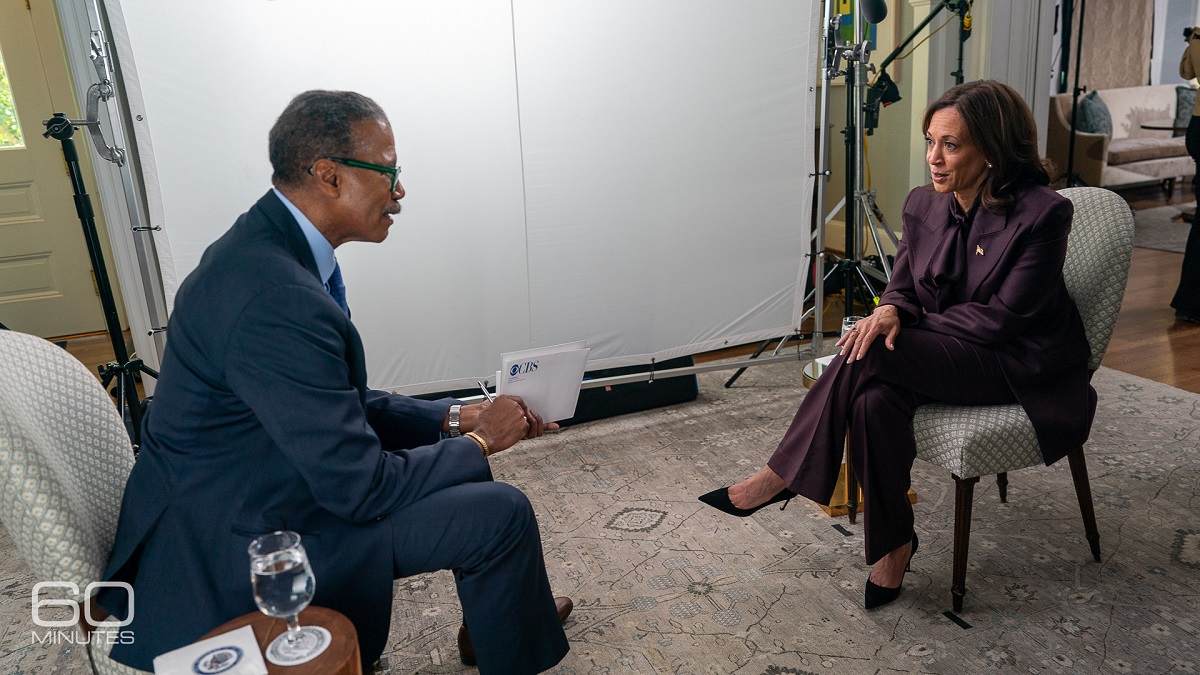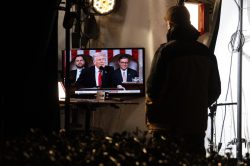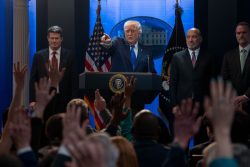
Bill Whitaker’s interview with Vice President Kamala Harris on CBS News’s “60 Minutes” aired Monday night.
12:27 JST, October 9, 2024
Vice President Kamala Harris appeared on a “60 Minutes” election special on Monday night, a long-standing tradition for major-party presidential candidates.
During the prime-time interview, correspondent Bill Whitaker grilled Harris on a wide range of issues, including how she would fund her economic proposals, gun ownership, the escalation of hostilities in the Middle East and the Biden administration’s border policy.
Her Republican rival, former president Donald Trump, backed out of the program last week after previously agreeing to be interviewed, CBS said. It added that the Trump campaign gave “shifting explanations” for the cancellation, including that the interview would be fact-checked.
Trump campaign manager Steven Cheung took aim at the program last week, saying the interview had not been scheduled. “They also insisted on doing live fact checking, which is unprecedented,” he wrote on X. Harris targeted Trump for backing out, saying in the interview that viewers can watch his rallies and see that he talks only about himself.
In the days following their debate last month, Trump said he would not debate Harris a second time. CBS said the Monday night election special was possibly the last opportunity before the Nov. 5 election for a national audience to hear from both candidates individually.
Here are the highlights from the interview with Harris.
1. Economic agenda
The Democratic presidential nominee was questioned on how she would pay for her economic proposals, which include bolstering small businesses, expanding the child tax credit and banning corporate price gouging for food and other groceries. Whitaker cited an estimate by the nonpartisan Committee for a Responsible Federal Budget that her economic plan would add $3 trillion to the national debt over the next decade. The nonprofit estimates that Trump’s plan would add $7.5 trillion.
“I’m going to make sure that the richest among us, who can afford it, pay their fair share in taxes,” Harris said, arguing that her plan would strengthen the economy and Trump’s would weaken it. “It is not right that teachers and nurses and firefighters are paying a higher tax rate than billionaires and the biggest corporations, and I plan on making that fair.”
When asked how she would implement that in “the real world,” including gaining enough votes in Congress, Harris suggested that public support for such plans would help drive support among lawmakers.
“When you talk quietly with a lot of folks in Congress, they know exactly what I’m talking about because their constituents know exactly what I’m talking about,” she said. “Their constituents are those firefighters and teachers and nurses.”
2. Gun ownership
Harris, who has spoken multiple times on the campaign trail about owning a firearm, offered more details about being a gun owner.
“I have a Glock, and I’ve had it for quite some time. And – I mean, look, Bill, my background is in law enforcement,” she told Whitaker, who asked whether she had ever fired it.
“Yes. Of course I have,” Harris said with a chuckle. “At a shooting range. Yes, of course I have.”
In the presidential debate in September, Harris said she was a gun owner and disputed Trump’s assertions that she would take guns from people. “We’re not taking anybody’s guns away,” she said. Later, during a town hall with Oprah Winfrey, Harris reiterated that point: “If somebody breaks into my house, they’re getting shot.”
3. Escalation in the Middle East
Whitaker began the interview by asking Harris what the United States could do to prevent an all-out regional war in the Middle East, where the conflict has recently escalated.
Noting the anniversary of Hamas’s Oct. 7, 2023, attack, Harris said the war in Gaza has to end, maintaining both that Israel has the right to defend itself and that too many innocent Palestinian civilians have been killed.
She was asked whether the United States lacks influence over Israeli Prime Minister Benjamin Netanyahu, with Whitaker pressing her on the Biden administration’s calls for a cease-fire being at odds with Netanyahu’s actions.
“Do we have a real, close ally in Prime Minister Netanyahu?” Whitaker asked.
“I think, with all due respect, the better question is, do we have an important alliance between the American people and the Israeli people,” Harris said. “And the answer to that question is yes.”
4. Immigration
Harris was asked about her recent visit to the border town of Douglas, Ariz., and new restrictions imposed by the Biden administration that have sharply reduced the number of unlawful border crossings after what Whitaker called a “historic flood” in their first three years in office.
The Democratic nominee defended the administration, saying that the first bill it submitted to Congress aimed to reform the immigration system but that it was not taken up. She went on to fault Trump’s role in derailing a bipartisan border security bill.
“Donald Trump got word that this bill was afoot and could be passed, and he wants to run on a problem instead of fixing a problem, so he told his buddies in Congress, ‘Kill the bill. Don’t let it move forward.’” she said.
Trump’s public criticism and mischaracterization of the bill helped torpedo it. He has pledged to launch the “largest domestic deportation operation” in history and regularly uses inflammatory rhetoric against immigrants.
When Whitaker pressed Harris on whether it was a mistake to loosen policies that offered a path to legalization for millions of undocumented immigrants, she called U.S. immigration policy a “long-standing problem.”
“And solutions are at hand. And from Day One, literally, we have been offering solutions,” Harris responded, adding, “We need Congress to be able to act to actually fix the problem.”
Top Articles in News Services
-

Survey Shows False Election Info Perceived as True
-

Hong Kong Ex-Publisher Jimmy Lai’s Sentence Raises International Outcry as China Defends It
-

Japan’s Nikkei Stock Average Touches 58,000 as Yen, Jgbs Rally on Election Fallout (UPDATE 1)
-

Japan’s Nikkei Stock Average Falls as US-Iran Tensions Unsettle Investors (UPDATE 1)
-

Trump Names Former Federal Reserve Governor Warsh as the Next Fed Chair, Replacing Powell
JN ACCESS RANKING
-

Producer Behind Pop Group XG Arrested for Cocaine Possession
-

Japan PM Takaichi’s Cabinet Resigns en Masse
-

Man Infected with Measles Reportedly Dined at Restaurant in Tokyo Station
-

Israeli Ambassador to Japan Speaks about Japan’s Role in the Reconstruction of Gaza
-

Videos Plagiarized, Reposted with False Subtitles Claiming ‘Ryukyu Belongs to China’; Anti-China False Information Also Posted in Japan

























